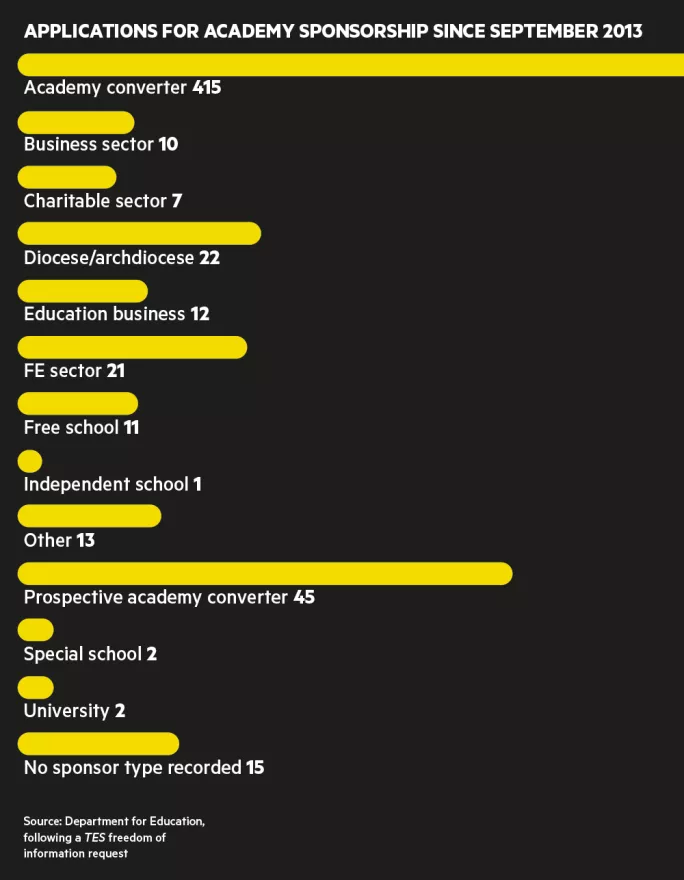Businesses resist calls to sponsor academies

Businesses have snubbed repeated government pleas to sponsor academies, figures obtained by TES reveal.
They also show that only two universities and one independent school - sectors the government is relying on to increase the number of good school places - have applied to become sponsors since September 2013.
When the first academies opened under Labour in 2002, the government encouraged businesses to sponsor them, bringing in outside expertise to turn around failing schools. The plea has been echoed by the coalition and the current government.
Education minister Lord Nash travelled to Norwich in July 2013 to lobby business leaders to sponsor schools, and visited Leeds three months later to “urge businesses and public-spirited individuals and groups to come forward and sponsor an academy”.
‘Join the schools revolution’
Two years later, then education secretary Nicky Morgan made a similar plea to what the Department for Education described as a “gathering of England’s top business leaders” in the House of Lords.
“Whether by founding or developing academy trusts, joining governing bodies to provide oversight and encouragement, or providing careers advice and mentoring, I am today calling for more business leaders to play their part and join the schools revolution,” she said.
However, figures released to TES following a freedom of information request show that, out of 576 applications to become academy sponsors since 2013-14, only 10 came from the business sector with a further 12 from education businesses.
Shadow education secretary Angela Rayner described it as “yet another failed Tory policy”. She added: “Businesses are ignoring all the Conservative pleas to sponsor academies, and the response from universities and the independent sector is even more woeful.
“Education needs government investment and support at every level if our children are to fulfil all their rich potential - they can’t shove responsibility on to others if Britain is to compete, post-Brexit.”
Since September 2013, 80 per cent of sponsorship applications have come from either academy converters or prospective academy converters. The proportion coming from other sectors fell from 24 per cent in 2013-14 to 15 per cent in 2015-16.
‘Education needs government investment and support at every level if our children are to fulfil all their rich potential’
Matthew Wolton, a partner specialising in academies at law firm Knights, was surprised by the small number of business applications, which he attributed to the risk of reputational damage.
Mr Wolton said that academies sponsored by businesses or public schools received “a great deal more scrutiny from people with an agenda, compared to other people doing it”.
He also pointed to the changing academy landscape, adding: “You no longer sponsor a school. You are a multi-academy trust or go home. It’s a different model.”
John Blake, incoming head of education and social reform at the Policy Exchange thinktank, said that while businesses were unlikely to improve teaching and learning in schools, there were other powerful benefits for both parties.
He told TES: “The schools get access to management, human resources, administrative support, and ideas about to how do these that are perhaps not common within the school sector.
“But I think it is also useful for businesses to know what’s going on in schools, so they have some sense of what knowledge their next generation of employees will have.”

Intentions vs expertise
However, Robert Hill, an education consultant and former adviser to Tony Blair at Downing Street, said there were better ways for businesses to help the education system.
“Companies and corporate bodies are much more likely to help progress the academies and multi-academy trust agenda by encouraging some of their most able staff to serve as directors on trust boards than by venturing into the tough territory of school support and turnaround with good intentions but little expertise,” he added.
There has also been a big increase in the time the DfE takes to approve academy sponsor applications - from an average of 34 days in 2013-14, to 86 days so far in 2016-17 - the freedom of information request reveals.
The DfE said that the approval process had developed over time, with an assessment that included the overall vision, plans for growth, educational and financial capacity, and governance.
A spokesman said that regional schools commissioners would continue to encourage more sponsors to come forward, “including high-performing schools, strong grammar and independent schools and universities, as well as other leaders and businesses”.
He added: “Sponsorship is not, however, the only option. For instance the Academy Ambassadors scheme has appointed over 400 business people on to the boards of academy trusts as non-executive directors to share their expertise and innovation so every child has the excellent education they deserve.”
You need a Tes subscription to read this article
Subscribe now to read this article and get other subscriber-only content:
- Unlimited access to all Tes magazine content
- Exclusive subscriber-only stories
- Award-winning email newsletters
Already a subscriber? Log in
You need a subscription to read this article
Subscribe now to read this article and get other subscriber-only content, including:
- Unlimited access to all Tes magazine content
- Exclusive subscriber-only stories
- Award-winning email newsletters